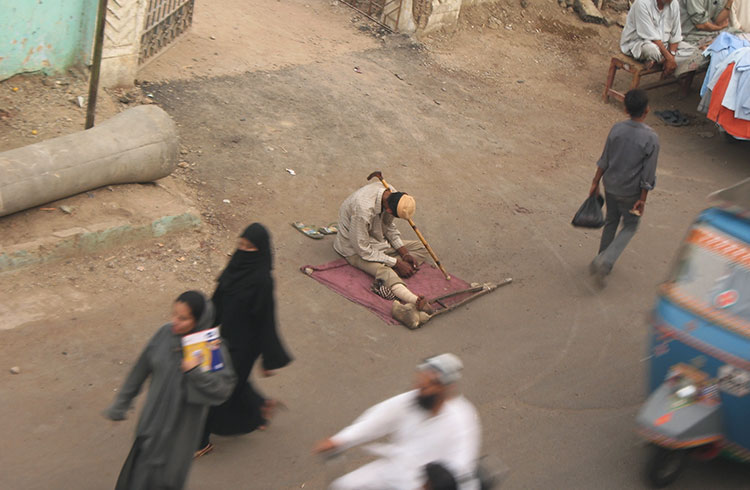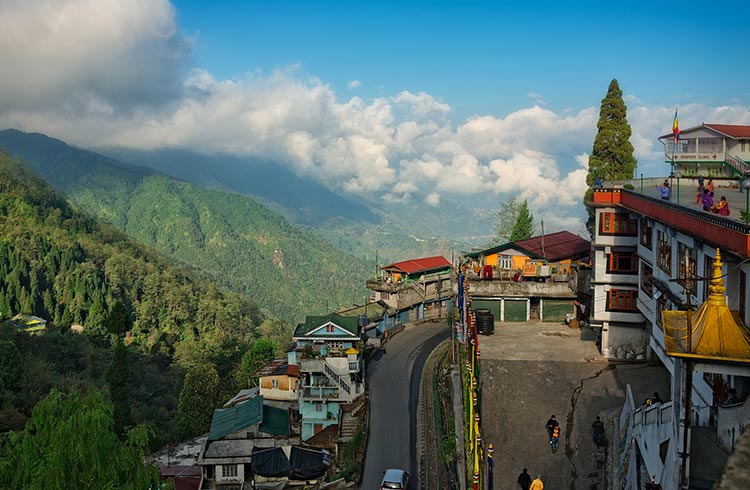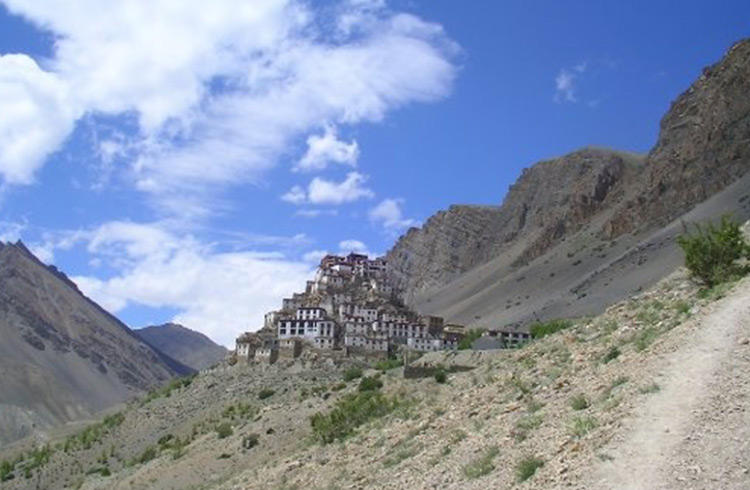A Fistful of Rupees: Coping with Beggars in India
Several years ago, on a solo trek in northern India, I was joined by an eight-year-old boy wearing a tattered red vest.
 Photo © iStock/danishkhan
Photo © iStock/danishkhan
Several years ago, on a solo trek in northern India, I was joined by an eight-year-old boy wearing a tattered red vest. He startled me with a phrase in perfect English:
"Excuse me, sir, but what is your hobby?"
Startled, I stammered a brief but no doubt incomprehensible reply about astrophotography. The lad took my gibberish in stride.
"Very good," he recited handily. "Mine is coin collecting. I collect coins of every country. Please, sir, you will give me a coin of your country. Any coin of your country. I want a coin of your country. You will give it to me NOW...."
This ingenious gambit was but a new angle on what has become one of the most common and frustrating dilemmas faced by travelers. Children (of all ages) in India, Nepal and Tibet — as well as Africa and the Americas — have come to see begging as a lucrative and entertaining form of trick-or-treat. Nor are their demands limited to cash. Returning tourists tell of being hounded for color film, batteries, even Motrin. Young porters in Nepal's Helambu region have been caught soliciting AA batteries for their Sony Walkmans; it's only a matter of time before trekkers into that ethereal realm are assailed by schoolchildren beggaring phone cards, MP3 diskettes and Nintendo cartridges.
(In Hindu and Buddhist cultures, of course, begging for alms is a well-established custom. It supports pilgrims and monks while giving lay persons an opportunity to practice generosity. Such spiritual mendicants, however, are easily distinguished from four-year-old urchins who cling to your shins and allow themselves to be dragged along for three miles.)
There's a kind of chicken-and-egg question about begging and giving on Third World trails. Which came first? Some people argue that impoverished locals, confronted by invading hordes of affluent tourists, were the first offenders. This makes little sense. People are unlikely to demand something they have never received before — and expectations of winning coins, candies or "school pens" from transient strangers were not conjured up by children in remote villages.
The problem started, more likely, with the first tourists and trekkers to visit these hamlets. Surrounded by raggedy children, and lacking any other means of explaining themselves, they began doling out money and sweets. Such behavior turns kids into beggars faster than you can say "one rupee" — as future travelers to those regions soon discovered. Even a used Bic is a rich prize to a kid whose parents make forty cents a day. In no time at all, anyone wearing rip-stop nylon became a potential mark.
* * *
Generosity isn't a habit we want to be cured of. Despite our sometimes better judgment, we will give things away. The trick, of course, is to do it without promoting greed or tooth-decay. It isn't difficult. With a bit of imagination and planning, gift-giving can be one of the most pleasurable parts of a trip — and a great way to forge connections with local children and families.
The first thing to remember while packing for a trip is that generosity doesn't have to mean giving away things. Sharing a bit of yourself, opening a window into your own world, is a good place to begin. During my years as a travel writer I've learned that people around the globe, from Bali to Belgium, have one thing in common: they all want to know about my family, and see what my home looks like.
For the oddest thing about westerners — from the Thai or Malian point of view — is that we tend to travel alone. Our apparent solitude is incomprehensible to people who have lived in one village, within an extended family, for generations. The quickest way to break the ice is to pack along some family snapshots, and a few dozen postcards of your home town. Such evidence places you in the world as a legitimate resident and creates a foundation for dialogue and friendship.
Dealing with children is not much different. They, too, are acting out of a natural curiosity: a desire to make contact with the bizarre-looking aliens tromping through their villages. Begging is a simple form of communication, and the possibility of a reward makes it all the more fun. But what these kids really want (like kids everywhere) is to be entertained. If you know how to juggle, do string figures or play the harmonica, you've got it made. If not, a few simple props will do. Cornered by a troupe of 10-year-old beggars in Delhi, I pulled out a small, inflatable world globe. What started as a feeding frenzy quickly became a geography lesson. The kids immediately began matching bits of news they'd heard on the radio — about Russia, Japan and the U.S. — to the appropriate countries, and argued heatedly about why India was pink and Pakistan blue.
A plastic magnifying glass, strong enough to burn holes in a dry leaf, seems miraculous to kids seeing it for the first time (but don't leave it behind; especially in a village of grass huts). Any toy store, or an outfit like the Nature Company, can supply you with cheap but astounding objects like gyroscopes, holograms and magnets. When I stop for a lunch break — and find myself surrounded by a bunch of kids with outstretched palms — I'll hand out colored pencils, and let them draw in my sketchpad. It's great fun, and their uninhibited sketches of mountains, flowers and beefy tourists in blimp-like parkas are among my most prized souvenirs.
Though I demonstrate things like kaleidoscopes and prisms, I rarely give them away. The kids don't mind; their natural appetite for engagement has been satisfied. Sometimes, though, at an unusually hospitable lodge, I'll befriend the owners and want to offer a token gift to them and/or their children. For these situations, I offer two rules of thumb.
First, and most importantly, NEVER give gifts directly to children. Give the present to a parent (or an older sibling) and let them make the actual presentation. Such a gesture is a sign of respect, and reinforces the endangered notion that family members — rather than wealthy tourists — are the ones to turn to for gifts and rewards.
Second, it's unwise and irresponsible to give away money or candy (unless you're planning a follow-up visit with a dentist). There are other gifts more genuinely expressive of one's personality. Picture postcards, mentioned before, are light and cheap, but are always cherished — and displayed — by the people who receive them. Ball-point pens, folding pen-knives or 'disposable' lighters (they're refilled all over the Third World) are also appreciated. Don't get too exotic; a travel companion once gave a Moroccan woman a little green flashlight, and she chucked it into her stew.
Kids are easier. I recommend balloons, tops (stock up on those little Hanukkah dreidels before your trip), magnifying lenses, prisms, little rubber dinosaurs or those cool hologram stickers sold in card stores. These are fun and educational presents that kids can share, and that might help them unlock a few secrets of the universe to boot.
* * *
There is another, very different kind of begging, much more poignant and disturbing than requests for bon-bons or coins. Quite often — especially along major trekking routes — children and adults appeal to the traveler for basic medical supplies. First-aid items like aspirin, antibiotics or iodine are hard to refuse, especially when the person making the request substantiates their claim by clutching their head, doubling over or displaying a gaping wound.
It's a tough call. But playing doctor can sometimes backfire, with terrible results. What if the child is allergic to penicillin? What if blind faith in a temporary treatment (applying iodine, for example) keeps a villager from seeking further care?
My sense is that it's best to help however one can — short of dispensing drugs. I won't leap to the aid of anyone with a bruised elbow, but if a situation looks threatening I usually try to deal with it. In a few cases I've found out where the nearest health post was and given a relative (or local porter) enough money to take the sick or injured person there. This kind of behavior risks casting westerners as cure-all philanthropists, but watching people suffer isn't much of an alternative. Again, there's nothing inherently wrong with giving; problems arise when people give compulsively, without regard for the consequences.
Although I've portrayed myself as something of a saint, let it be known that I've left the imprint of my Vibram sole in more than one kid's rear end (the Indian coin-wallah being a prime example). I've also denied help to people who probably had legitimate claims on my good will. What to do? The issue is confusing, and every encounter is different.
As with so many other situations, though, a little mindfulness goes a long way. Before I give away anything to anyone, anywhere, I find it useful to ask myself a few questions. Will what I'm doing improve this person's life, or degrade it? Will it promote greed and dependency, or foster some small degree of autonomy? And finally: how will fellow travelers to this place — tomorrow, next month or ten years from now — be affected by my actions? For unless we can find a way to stop the cycle, what is now an irritating habit will become, for many Third World residents and their children, a way of life.
This frightening prospect became vividly clear to me two years ago, after I'd dragged an unusually persistent Limbu brat — affixed like a leech to my leg — all the way to his packed-earth house on Nepal's Naudanda Ridge. I deposited him on his doorstep, rapped on the door and began lecturing his mother. My name, I told her, is not "One Rupee"; she might try teaching her kid some manners.
She gave me an apologetic look, and extended her hand.
"One rupee," she demanded.
About the Author
Jeff Greenwald from Ethical Traveler. Ethical Traveler is full of great stories about empowering travelers to change the world.
Heading to India? Download our FREE Insider’s Guide!
Related articles
Simple and flexible travel insurance
You can buy at home or while traveling, and claim online from anywhere in the world. With 150+ adventure activities covered and 24/7 emergency assistance.
Get a quote

No Comments